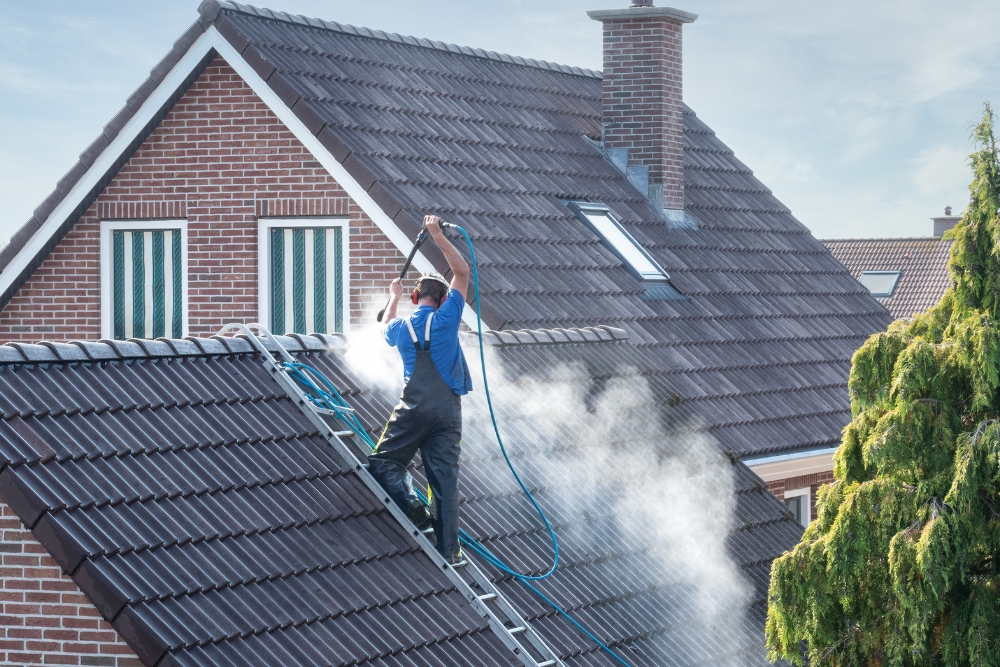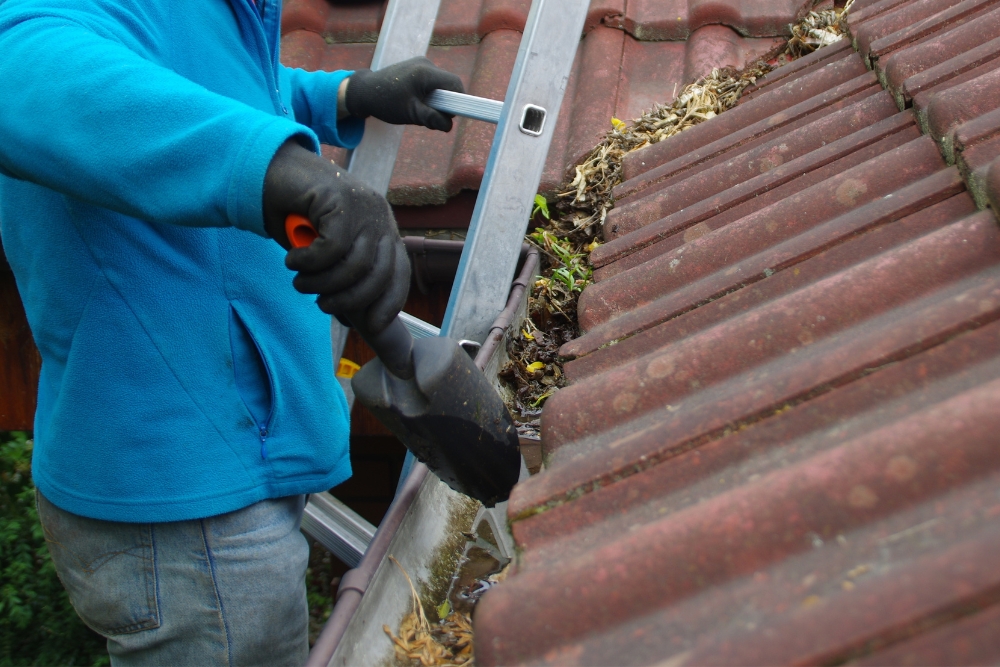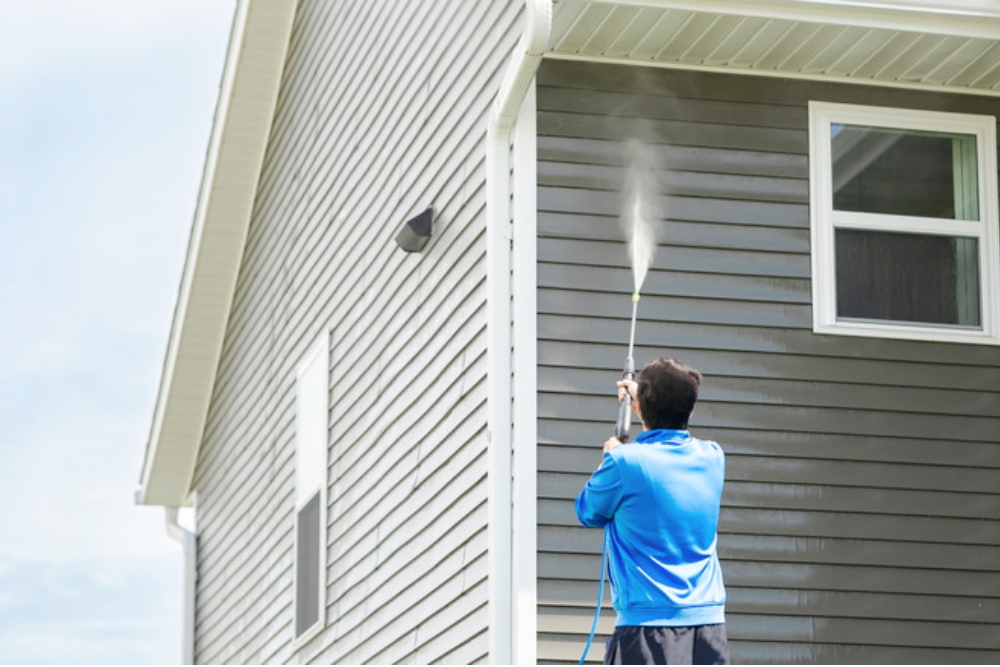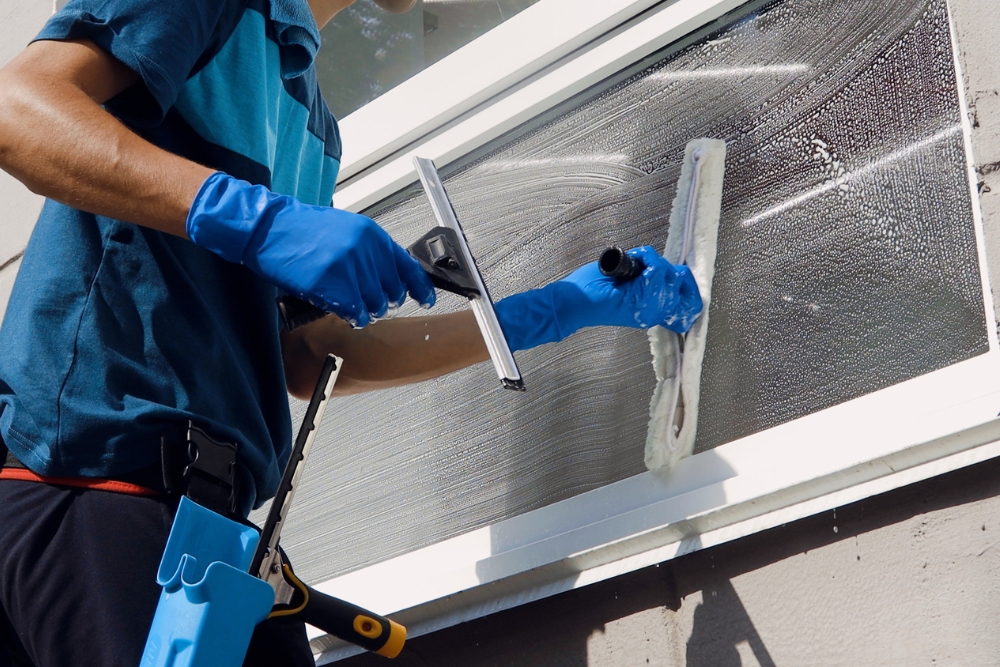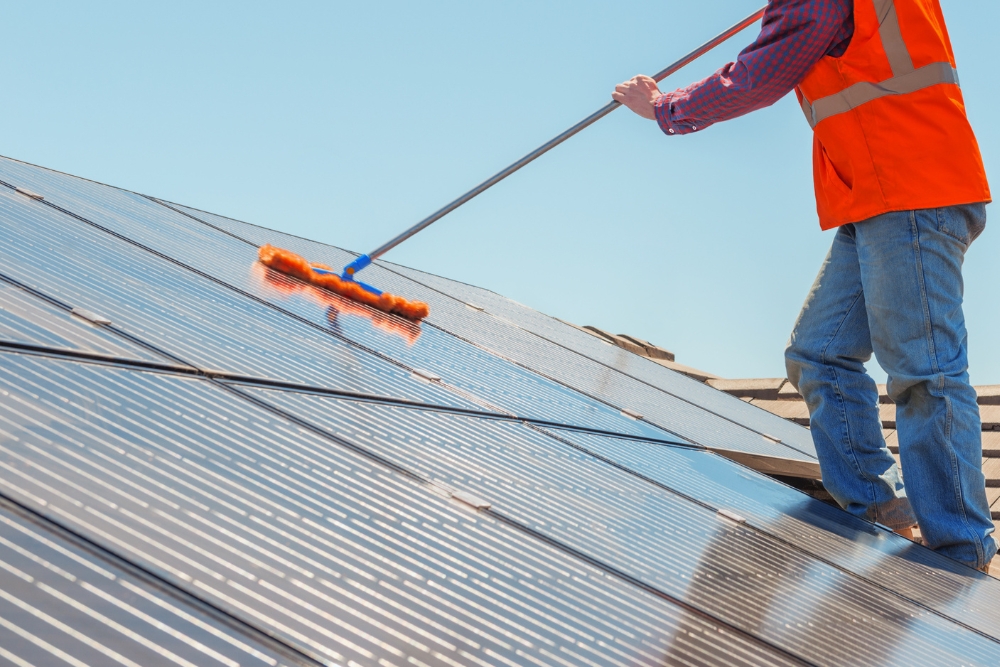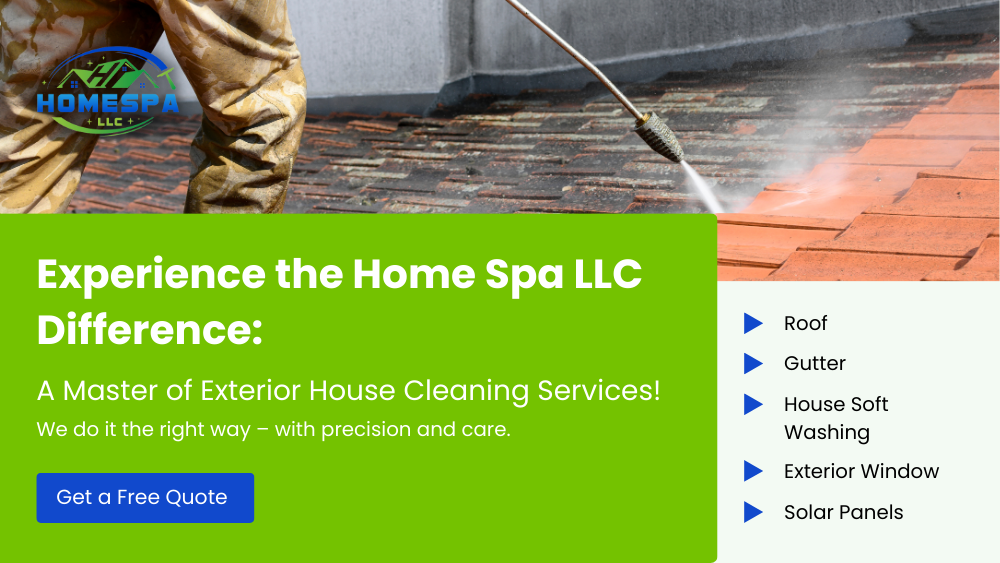What Chemical Is Used To Soft Wash A House?
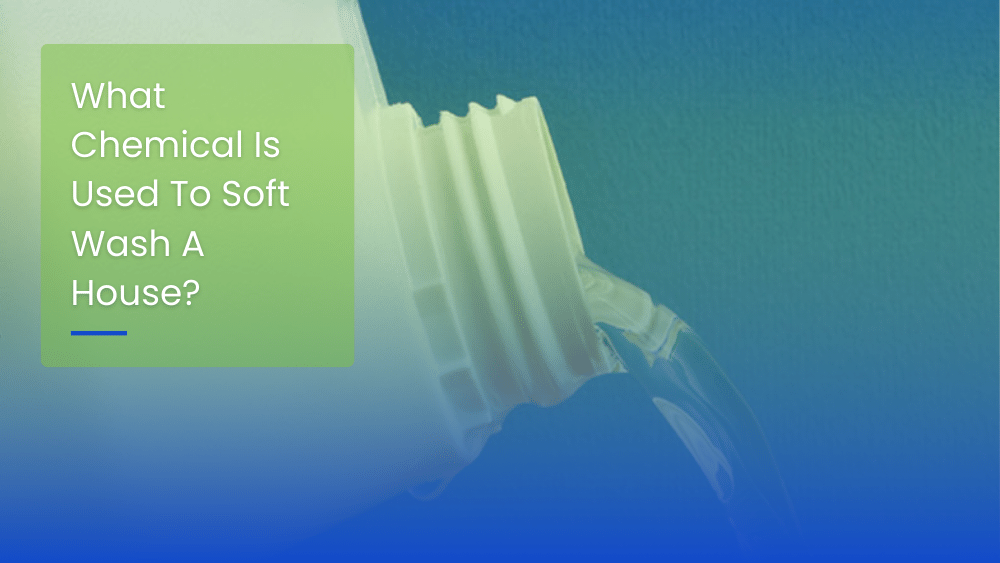
Soft washing has emerged as a preferred technique for cleaning the exterior surfaces of buildings, particularly houses, due to its gentle yet effective approach. Unlike traditional pressure washing, which can sometimes cause damage to delicate surfaces, soft washing relies on a chemical solution to break down and remove dirt, algae, mold, and other contaminants. Central to this process is the selection of the appropriate chemical agent, which plays a crucial role in achieving thorough cleaning without compromising the integrity of the surfaces being treated.
Soft washing is not a one-size-fits-all solution; rather, it involves a nuanced understanding of chemistry, surface materials, and environmental considerations. In this blog, we will explore the specific chemical used in soft washing and delve into its properties, mechanisms of action, safety precautions, and environmental impact. By gaining insights into the chemistry behind soft washing, homeowners can make informed decisions about maintaining the cleanliness and longevity of their homes' exteriors while minimizing risks to both health and the environment.
The Chemical: Sodium Hypochlorite
What is Sodium Hypochlorite?
Sodium hypochlorite is a chemical compound with the formula NaClO. It is commonly known as bleach and is widely used for its disinfectant and bleaching properties. Sodium hypochlorite is typically produced by the electrolysis of salt water and is available in various concentrations, with household bleach typically containing around 5% sodium hypochlorite.
How Does Sodium Hypochlorite Clean?
The cleaning action of sodium hypochlorite is attributed to its powerful oxidizing properties. When applied to surfaces, sodium hypochlorite reacts with organic materials such as algae, mold, mildew, and bacteria. The chlorine in sodium hypochlorite oxidizes these organic compounds, breaking them down into smaller, water-soluble molecules that can be easily rinsed away. This oxidation process effectively kills pathogens and removes stains, leaving surfaces clean and sanitized.
Concentration and Dilution
The effectiveness of sodium hypochlorite in soft washing depends on its concentration. Higher concentrations of sodium hypochlorite can provide more potent cleaning power but also pose greater risks, including potential damage to surfaces and increased health hazards. Dilution ratios must be carefully calculated to achieve the desired cleaning results while minimizing adverse effects. Professional soft washing companies often employ precise dilution techniques to ensure optimal performance and safety.
Safety Considerations
While sodium hypochlorite is an effective cleaning agent, it can be hazardous if mishandled. Direct contact with concentrated sodium hypochlorite can cause skin and eye irritation, and inhalation of its vapors may irritate the respiratory tract. Moreover, sodium hypochlorite can react with certain substances, such as acids or ammonia, to produce toxic gases. Therefore, safety precautions such as wearing protective gear (e.g., gloves, goggles, respiratory mask), ensuring adequate ventilation, and following proper dilution guidelines are essential to minimize risks to both users and bystanders. Additionally, spills and runoff containing sodium hypochlorite should be promptly contained and disposed of according to regulatory guidelines to prevent environmental contamination.
Effectiveness of Soft Washing with Sodium Hypochlorite
Surface Compatibility
Sodium hypochlorite is renowned for its versatility in cleaning various exterior surfaces commonly found on residential properties, including siding, stucco, brick, concrete, and wood. Understanding the compatibility of sodium hypochlorite with different materials is crucial to prevent damage during the soft washing process. For example, while sodium hypochlorite is generally safe for use on durable materials like vinyl siding and concrete, it may cause discoloration or deterioration of more delicate surfaces such as painted wood or certain types of stone. Therefore, professional soft washers carefully assess the composition and condition of each surface before applying sodium hypochlorite to ensure thorough cleaning without compromising structural integrity or aesthetic appeal.
Removal of Stains and Organic Growth
One of the primary benefits of soft washing with sodium hypochlorite is its effectiveness in removing stains caused by organic growth, such as algae, mold, mildew, lichen, and moss. These unsightly contaminants not only detract from the appearance of a home but can also compromise its structural integrity over time if left unchecked. Sodium hypochlorite's oxidizing action breaks down the cellular structure of organic matter, facilitating its removal from surfaces. Moreover, sodium hypochlorite's antimicrobial properties help kill existing microorganisms and inhibit their regrowth, prolonging the time between cleanings and extending the lifespan of exterior surfaces.
Durability Outcomes
Unlike traditional pressure washing, which merely blasts away surface dirt and debris, soft washing with sodium hypochlorite penetrates deep into porous surfaces to eradicate contaminants at their source. As a result, soft washing typically delivers longer-lasting results, with exterior surfaces remaining cleaner and free from organic growth for an extended period. This prolonged efficacy not only reduces the frequency of maintenance but also minimizes the need for harsh chemicals and excessive water usage, making soft washing a more sustainable and cost-effective cleaning solution in the long run.
Environmental Impact
While sodium hypochlorite is an effective cleaning agent, its environmental impact must be carefully considered and mitigated. Runoff containing sodium hypochlorite can harm aquatic ecosystems, terrestrial vegetation, and wildlife if not properly managed. To minimize environmental damage, soft washers employ various strategies, such as using containment barriers to capture runoff, implementing filtration systems to remove contaminants, and selecting biodegradable cleaning agents whenever possible. Additionally, soft washing techniques that rely on lower concentrations of sodium hypochlorite and reduced water usage can further reduce environmental footprint without compromising cleaning efficacy. By prioritizing environmental stewardship and adopting sustainable practices, soft washing professionals can help protect natural ecosystems while preserving the beauty and integrity of residential properties.
The #1 Exterior House Cleaning Contractor in Spokane Area
We do it the right way. We clean your home with precision and care, courtesy of Home Spa LLC! Serving Spokane, Spokane Valley, Liberty Lake, and Otis Orchards, Washington, our top-notch exterior cleaning services are exceptional. Picture a stain-free roof, clear gutters, a mold-free house, spotless windows, and gleaming solar panels.
At Home Spa LLC, we take pride in doing things the right way. Choose us for a cleaner, brighter home. Contact us today!
Alternatives and Supplemental Chemicals
Eco-Friendly Alternatives
While sodium hypochlorite is effective for cleaning, some individuals may prefer eco-friendly alternatives to minimize environmental impact. These alternatives often utilize plant-based ingredients or biodegradable surfactants to achieve comparable cleaning results without the use of harsh chemicals. For example, hydrogen peroxide-based cleaners offer a non-toxic and environmentally safe alternative for removing stains and disinfecting surfaces. Similarly, citrus-based solvents derived from natural sources can effectively dissolve grease, oil, and grime without posing risks to human health or the environment. By exploring eco-friendly alternatives, homeowners can reduce their carbon footprint and promote sustainability without sacrificing cleaning performance.
Surfactants and Additives
Surfactants play a crucial role in soft washing solutions by improving the spread and adherence of the cleaning agent to the surface being treated. These compounds reduce surface tension, allowing water and cleaning agents to penetrate more effectively into crevices and pores. Additionally, surfactants can enhance the solubility of contaminants, making them easier to rinse away during the cleaning process. Common surfactants used in soft washing formulations include alkyl polyglucosides, ethoxylated alcohols, and fatty acid esters. By incorporating surfactants into soft washing solutions, professionals can achieve more uniform coverage, better cleaning results, and reduced chemical usage, ultimately enhancing the overall efficiency and effectiveness of the cleaning process.
pH Balancing Agents
In some cases, pH balancing agents may be added to soft washing solutions to neutralize the alkalinity of sodium hypochlorite and mitigate potential damage to sensitive surfaces or nearby vegetation. These agents typically consist of mild acids or buffers that help restore the natural pH balance of the treated surface after cleaning. By neutralizing residual alkalinity, pH balancing agents prevent etching, discoloration, or other forms of damage that may occur due to prolonged exposure to high-pH solutions. Additionally, pH balancing agents can help minimize environmental impact by reducing the risk of runoff contamination and promoting the safe disposal of cleaning residues.
Custom Blends and Formulations
Professional soft washing companies often offer custom blends and formulations tailored to the specific cleaning needs and preferences of their clients. These custom blends may combine sodium hypochlorite with other chemicals, surfactants, or additives in precise ratios to achieve optimal cleaning results while minimizing environmental impact. For example, some formulations may incorporate enzymes or microbial agents to target specific types of organic contaminants, such as grease, oil, or protein stains. By consulting with experienced professionals and selecting custom blends tailored to their unique requirements, homeowners can ensure effective cleaning outcomes without compromising safety, sustainability, or surface integrity.
Frequently Asked Questions
Frequently Asked Questions
Curious about soft washing and the chemicals used to clean your home’s exterior? You’re in the right place! Below, we’ve compiled a list of frequently asked questions (FAQs) to provide you with valuable insights into this popular cleaning method. Whether you’re wondering about the safety of soft washing, the effectiveness of different cleaning agents, or the environmental impact of cleaning chemicals, we’ve got you covered.
Curious about soft washing and the chemicals used to clean your home’s exterior? You’re in the right place! Below, we’ve compiled a list of frequently asked questions (FAQs) to provide you with valuable insights into this popular cleaning method. Whether you’re wondering about the safety of soft washing, the effectiveness of different cleaning agents, or the environmental impact of cleaning chemicals, we’ve got you covered.
While soft washing is generally safe for most exterior surfaces, it’s essential to assess each surface’s material and condition before proceeding. Delicate surfaces such as painted wood or certain types of stone may require special care to avoid damage.
The frequency of soft washing depends on various factors, including the climate, location, and prevalence of organic growth. As a general guideline, most homeowners opt for soft washing every 1-3 years to maintain the cleanliness and appearance of their homes.
While sodium hypochlorite is effective for cleaning, its environmental impact must be carefully managed. Runoff containing sodium hypochlorite can harm aquatic ecosystems and vegetation if not properly contained and disposed of. Using lower concentrations and eco-friendly alternatives can help minimize environmental damage.
Yes, soft washing with sodium hypochlorite can help inhibit the regrowth of algae, mold, and mildew by killing existing microorganisms and removing organic matter from surfaces. Additionally, regular soft washing maintenance can help prevent the accumulation of dirt and debris that provide a conducive environment for organic growth.

